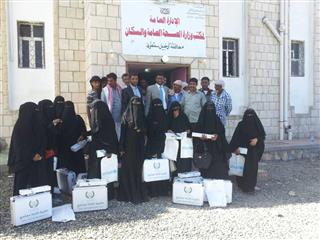

Worldwide Services
Yemen


Report Activities 2017

Since 2010 Worldwide Services has been assisting the Health Office of the Archipelago of Socotra in providing healthcare both in the capital of Hadibo as well as in the area.
We are glad that, despite the war on the mainland, we could continue these services over the whole year of 2017. Because it is almost impossible for foreigners to travel to and from the island, at present our organization has only one couple on Socotra, consisting of an experienced tropical doctor and a nurse.
The nurse has been conducting a weekly clinic in the General Health Center of the island in Hadibo, with the focus on feeding advice for young mothers. The great majority of the mothers do really well. They do give breastfeeding and are faithful in getting the vaccinations for their children.
A special point of attention has been the extra help for new born babies with a cleft palate.
The mothers are instructed to make the milk a bit thicker, which makes it easier for the infant to swallow. The resulting weight gain is quite amazing. Fortunately the condition is quite rare; we only see a few new cases per year. For one reason or another, nearly all children born on the island with a cleft, only have a cleft palate. Seldom or never the lips or gums are involved, while worldwide this is most common.
Three days a week patient care was given by the tropical doctor of Worldwide Services in the Sheikh Khalifa hospital in the capital of the island Socotra. Consultations were given to both male and female patients, especially a good number of pregnant ladies for antenatal care. We are pleased to see that more and more women are coming for antenatal care, even if the reason for their visit to the hospital - getting an ultrasound - is not always the right one. But even so, this gives opportunity to discover and if possible to correct medical anomalies like anemia and less common conditions as hypertension in pregnancy, pre-eclampsia, breech presentation, low-lying placenta or placenta previa, and a variety of other abnormalities.
It has been a pleasure to work again with the assistance of a local nurse practitioner. This created good opportunities for training and the transferral of knowledge. The nurse practitioner also was a real help in taking the history of patients and where needed in translating from Arabic into the Socotri language.
Over the past year, the WS physician has shared his clinic room with a new urologist from Tajikistan. It has been very rewarding and profitable to work together and to see how many patients, who needed to be referred to the mainland in the past, could now have surgery for their kidney (or ureter) stones, benign prostatic hyperplasia and other urological conditions. One day a week was scheduled for surgery.
One day a week has been reserved for the outpatient clinics in Qalansiya and Noged. Although these visits are time and energy consuming, they are also rewarding and much appreciated.
Especially in the Noged area, with a total population of ten thousand people and no medical doctor, the visits are much needed. Mother and Child care are given priority, but if needed other patients are treated as well. In this past year the WS Physician has been training a young and enthusiastic midwife in doing ultrasound examinations on pregnant women. She has gained a lot of experience and has gotten quite proficient at it.
Just a short while ago she finished her midwifery training in Mukalla.
Recommendations:
1. Many people on the island believe that, beside breast milk, babies need to be given additional water to stay healthy. But often these infants, who drink water from a bottle, do not get sufficient nourishment and become underweight. Many a mother then starts adding milk powder to the bottle, which, without exception, results in a sharp decrease of the breast milk.
In order to tackle this problem effectively, more is needed than just the teaching in the post-natal health care unit. Consultation is needed between the Health Office and the Educational Department of the Island, on how to address this issue on a larger scale.
2. Antibiotics are being prescribed frequently on the island. In some cases they are given without proper indication, often in the expensive intravenous form.
Lately awareness of this problem has grown at the Sheikh Khalifa Hospital, and attempts are being made to reduce the inappropriate dispensing of medicines. However, there are yet several private clinics and numerous pharmacies which do not adhere to WHO standards and regulations. We strongly recommend that the Health Office will issue clear guidelines on the use of antibiotics, and will device a mechanism to check the adherence to these guidelines.
News

A group of young new midwives, all from Socotra, have just finished their three years training in Mukalla. From the Director of Health of Socotra they all received a complete set of instruments for the purpose of home deliveries.



Yemen is one of the oldest centers of civilization in the Near East. Its capital and largest city is Sana'a. Yemen's territory includes over 200 islands, the largest of which is Socotra, about 354 km (220 mi) to the south of mainland Yemen. It is the only state in the Arabian Peninsula to have a purely republican form of government. Yemen was the first country in the Arabian peninsula to grant women the right to vote. Yemeni unification took place on 22 May 1990, when North Yemen was united with South Yemen, forming the Republic of Yemen.
The majority of Yemen's population is divided into tribal groups, especially in the northern areas of the country where 85% of local residents belong to various tribes. There are also small groups of peoples of Turkish/Ottoman origin in urban areas. Roughly 66% of the population are Sunni Muslims following the Shafi'i school while 34% adhere to the Zaydi Shia branch of Islam with small minorities of Ismali Muslims.
A Shia rebel movement, the Houthis, emerged in the early 2000s, claiming it would fight against what it saw as the marginalization of the Shi’ites of the Zaydi sect, which prevails in the Yemeni highlands.